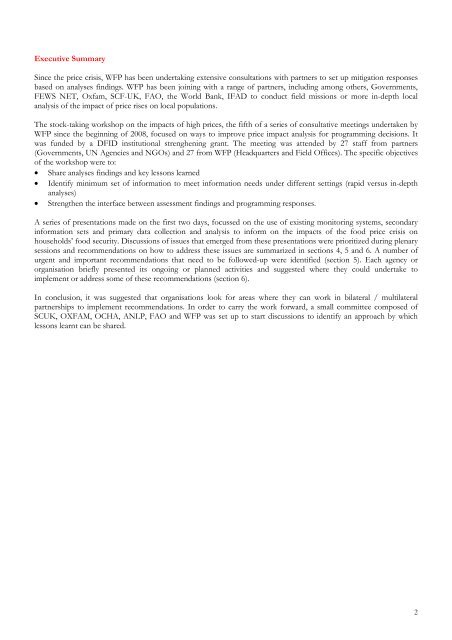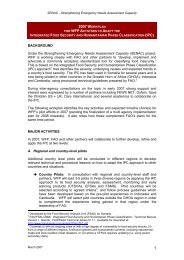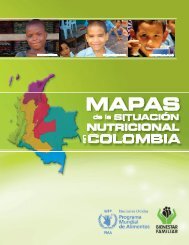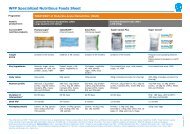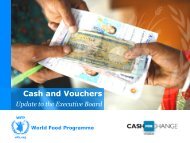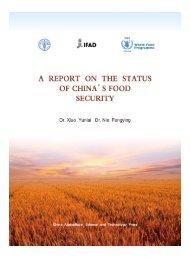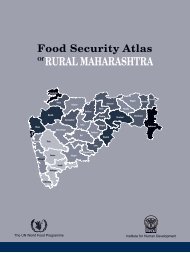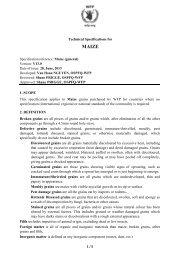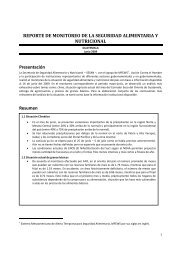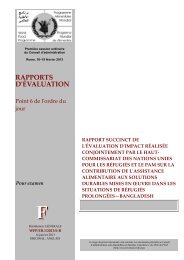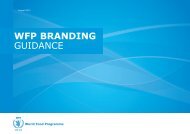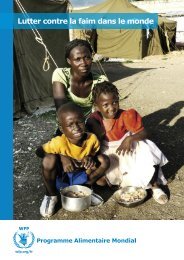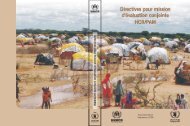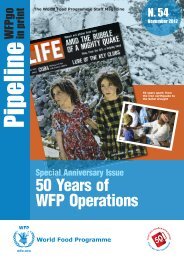High Food Price Impact Assessment and Analysis - WFP Remote ...
High Food Price Impact Assessment and Analysis - WFP Remote ...
High Food Price Impact Assessment and Analysis - WFP Remote ...
Create successful ePaper yourself
Turn your PDF publications into a flip-book with our unique Google optimized e-Paper software.
Executive Summary<br />
Since the price crisis, <strong>WFP</strong> has been undertaking extensive consultations with partners to set up mitigation responses<br />
based on analyses findings. <strong>WFP</strong> has been joining with a range of partners, including among others, Governments,<br />
FEWS NET, Oxfam, SCF-UK, FAO, the World Bank, IFAD to conduct field missions or more in-depth local<br />
analysis of the impact of price rises on local populations.<br />
The stock-taking workshop on the impacts of high prices, the fifth of a series of consultative meetings undertaken by<br />
<strong>WFP</strong> since the beginning of 2008, focused on ways to improve price impact analysis for programming decisions. It<br />
was funded by a DFID institutional strenghening grant. The meeting was attended by 27 staff from partners<br />
(Governments, UN Agencies <strong>and</strong> NGOs) <strong>and</strong> 27 from <strong>WFP</strong> (Headquarters <strong>and</strong> Field Offices). The specific objectives<br />
of the workshop were to:<br />
• Share analyses findings <strong>and</strong> key lessons learned<br />
• Identify minimum set of information to meet information needs under different settings (rapid versus in-depth<br />
analyses)<br />
• Strengthen the interface between assessment findings <strong>and</strong> programming responses.<br />
A series of presentations made on the first two days, focussed on the use of existing monitoring systems, secondary<br />
information sets <strong>and</strong> primary data collection <strong>and</strong> analysis to inform on the impacts of the food price crisis on<br />
households’ food security. Discussions of issues that emerged from these presentations were prioritized during plenary<br />
sessions <strong>and</strong> recommendations on how to address these issues are summarized in sections 4, 5 <strong>and</strong> 6. A number of<br />
urgent <strong>and</strong> important recommendations that need to be followed-up were identified (section 5). Each agency or<br />
organisation briefly presented its ongoing or planned activities <strong>and</strong> suggested where they could undertake to<br />
implement or address some of these recommendations (section 6).<br />
In conclusion, it was suggested that organisations look for areas where they can work in bilateral / multilateral<br />
partnerships to implement recommendations. In order to carry the work forward, a small committee composed of<br />
SCUK, OXFAM, OCHA, ANLP, FAO <strong>and</strong> <strong>WFP</strong> was set up to start discussions to identify an approach by which<br />
lessons learnt can be shared.<br />
2


